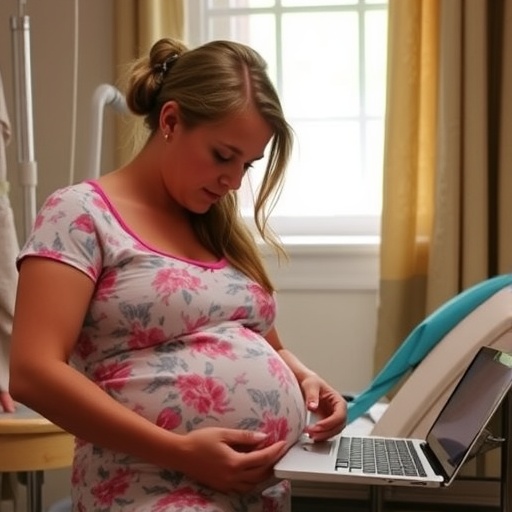In recent years, the discourse around women’s health has gained significant momentum, revealing the urgent need for enhancements in health strategies tailored specifically for women. One particularly debilitating condition that has come into sharp focus is hyperemesis gravidarum (HG), a severe form of nausea and vomiting during pregnancy that impacts not only the health of the expecting mother but also the wellbeing of the fetus. A groundbreaking initiative spearheaded by researchers including Nana, M., Haggar, T., and Boulding, H., has aimed to tackle the intricate challenges associated with this severe condition through innovative policy-making frameworks.
Hyperemesis gravidarum is not merely morning sickness; it is a complex condition that can result in severe dehydration, weight loss, and nutritional deficiencies, often requiring hospitalization. The condition affects approximately 0.5% to 2% of pregnant women and can lead to a multitude of physical and psychological complications. Consequently, it is crucial to develop effective management strategies for HG to alleviate the burden on affected women and the healthcare system.
The recent policy lab initiative delves deep into the intricacies of hyperemesis gravidarum, utilizing a collaborative approach that brings together stakeholders from various sectors, including healthcare providers, policymakers, researchers, and women who have experienced HG. This inclusive methodology aims to generate a comprehensive understanding of the condition, providing a foundation for developing actionable solutions that are both effective and sustainable.
Research indicates that many medical professionals often under-recognize HG, leading to delayed treatment and inadequate support for women suffering from this debilitating condition. The policy lab seeks to bridge this knowledge gap, promoting awareness and education about the symptoms, risks, and available treatment options among healthcare providers. Empowering practitioners to recognize and respond effectively to HG is a crucial step in enhancing patient outcomes.
A keen focus of the initiative is on ensuring access to evidence-based resources for women experiencing hyperemesis gravidarum. Many women report feeling isolated and misunderstood during their pregnancies, as societal perceptions around pregnancy often dismiss severe conditions like HG as inconsequential. Therefore, the policy lab aims to provide women with reliable information and support mechanisms, equipping them with the tools needed to advocate for their health in medical settings.
Moreover, the lab is actively investigating the psychological ramifications of hyperemesis gravidarum. Women grappling with HG often face mental health challenges, including anxiety and depression, exacerbated by feelings of guilt or inadequacy during a period often perceived as joyous. Addressing these emotional facets is essential for developing holistic treatment solutions that consider the overall health of the woman and not just the physical symptoms of the condition.
The unique aspect of the policy lab approach is that it is highly adaptable and based on feedback from women who have experienced HG firsthand. By incorporating their perspectives into the policymaking process, the initiative has the potential to generate more meaningful, relevant, and sensitive health strategies that truly resonate with the target population. This participant-driven model of research ensures that the strategies developed are not only scientifically sound but also practically applicable.
Furthermore, while the primary focus is on hyperemesis gravidarum, the lab also stands to benefit broader discussions surrounding maternal health and well-being. The holistic strategies developed can lend themselves to improving care for all women experiencing similar challenges during pregnancy, leading to an overall enhancement of women’s health services.
As government entities and health organizations observe the outcomes of this policy lab, they may find a blueprint for addressing other complex health issues affecting women. The initiative provides a pioneering example of multidisciplinary collaboration, where insights gathered from various sectors contribute to creating a more robust and effective healthcare response.
The need for continuous research in this area cannot be overstressed. As further studies emerge from the policy lab, they will provide vital data that can influence policies and shift societal norms about female reproductive health. Tackling hyperemesis gravidarum is not only a matter of providing immediate relief; it is also about reshaping the understanding and infrastructure surrounding women’s health in a broader context.
In conclusion, advancing the women’s health strategy through this policy lab represents a critical step forward in addressing the pressing issue of hyperemesis gravidarum. The coordinated effort among stakeholders, grounded in direct experiences of women, embodies a new frontier in healthcare policymaking. This initiative holds the promise of not only improving management for those affected by HG but also elevating the discourse around women’s health generally, paving the way for more comprehensive care strategies in the future.
As the discussion continues, there is an urgent call to action for healthcare systems globally to recognize and prioritize the unique healthcare needs of women, particularly during the transformative period of pregnancy. With continued research and advocacy, the hope is to create a health landscape that is responsive, supportive, and empowering for all women.
The trajectory set forth by this initiative is indicative of a larger movement towards rethinking how women’s health issues are approached, ultimately aiming to enhance quality of life and health outcomes for future generations.
Subject of Research: Hyperemesis Gravidarum Management Strategies
Article Title: Advancing the women’s health strategy: a policy lab aimed at improving effective management of hyperemesis gravidarum
Article References: Nana, M., Haggar, T., Boulding, H. et al. Advancing the women’s health strategy: a policy lab aimed at improving effective management of hyperemesis gravidarum.
Health Res Policy Sys 23, 123 (2025). https://doi.org/10.1186/s12961-025-01384-y
Image Credits: AI Generated
DOI: https://doi.org/10.1186/s12961-025-01384-y
Keywords: women’s health, hyperemesis gravidarum, policy lab, maternal health, healthcare strategies




